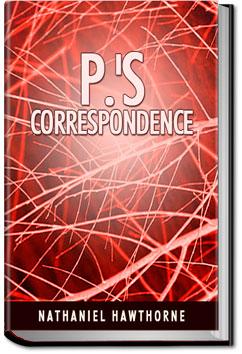UNLIMITED Audiobooks and eBooks
Over 40,000 books & works on all major devices
Get ALL YOU CAN for FREE for 30 days!
P.'s Correspondence
Nathaniel Hawthorne
Book Overview:
P.'s Correspondence" is a short story by t Nathaniel Hawthorne, constituting a pioneering work of alternate history. Some consider it the very first such work in the English language.
The story uses the technique of the false document, common in literature of the period. It purports to transcribe a letter written by a mentally-deranged friend of the writer, identified only by the initial "P." (supposedly to protect his privacy). As presented in the preface, the writer seems to share with the rest of the world the belief that his friend is indeed mad, and publishes the text as an act of kindness rather than out of believing in its veracity.
However, the text attributed to P. is far from looking like the ravings of a madman. Rather, it seems the product of a rational and sensitive mind placed in the impossible situation of simultaneously perceiving two realities which contradict each other in numerous important details, having no explanation for this phenomenon, and being increasingly unable to decide which is true and which is imaginary. (Summary by Wikipedia)
P.'s Correspondence" is a short story by t Nathaniel Hawthorne, constituting a pioneering work of alternate history. Some consider it the very first such work in the English language.
The story uses the technique of the false document, common in literature of the period. It purports to transcribe a letter written by a mentally-deranged friend of the writer, identified only by the initial "P." (supposedly to protect his privacy). As presented in the preface, the writer seems to share with the rest of the world the belief that his friend is indeed mad, and publishes the text as an act of kindness rather than out of believing in its veracity.
However, the text attributed to P. is far from looking like the ravings of a madman. Rather, it seems the product of a rational and sensitive mind placed in the impossible situation of simultaneously perceiving two realities which contradict each other in numerous important details, having no explanation for this phenomenon, and being increasingly unable to decide which is true and which is imaginary. (Summary by Wikipedia)
How does All You Can Books work?
All You Can Books gives you UNLIMITED access to over 40,000 Audiobooks, eBooks, and Foreign Language courses. Download as many audiobooks, ebooks, language audio courses, and language e-workbooks as you want during the FREE trial and it's all yours to keep even if you cancel during the FREE trial. The service works on any major device including computers, smartphones, music players, e-readers, and tablets. You can try the service for FREE for 30 days then it's just $19.99 per month after that. So for the price everyone else charges for just 1 book, we offer you UNLIMITED audio books, e-books and language courses to download and enjoy as you please. No restrictions.
Try now for FREE!

"Love your service - thanks so much for what you do!"
- Customer Cathryn Mazer
"I did not realize that you would have so many audio books I would enjoy"
- Customer Sharon Morrison
"For all my fellow Audio Book & E-Book regulars:
This is about as close to nirvana as I have found!"
- Twitter post from @bobbyekat


